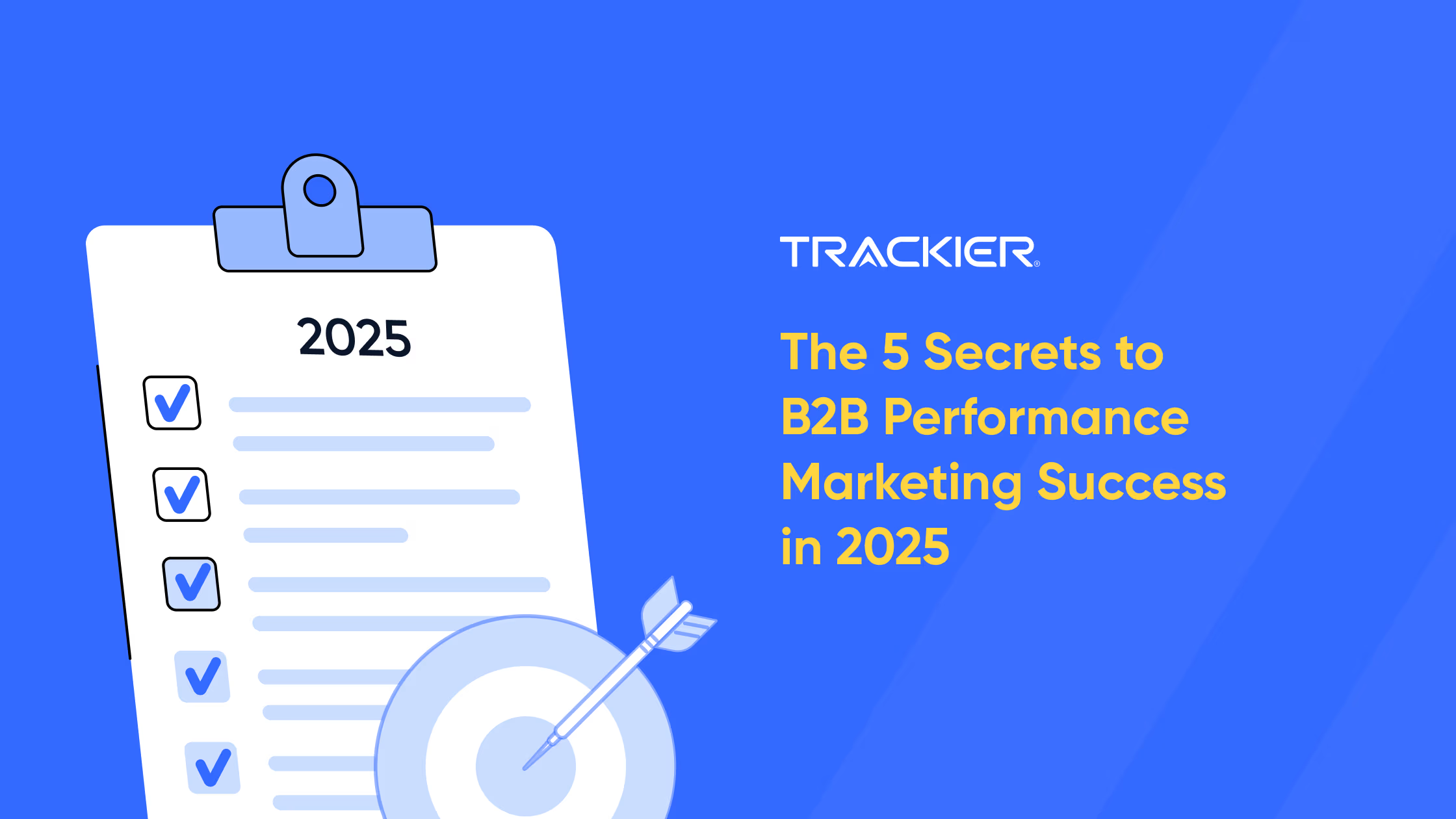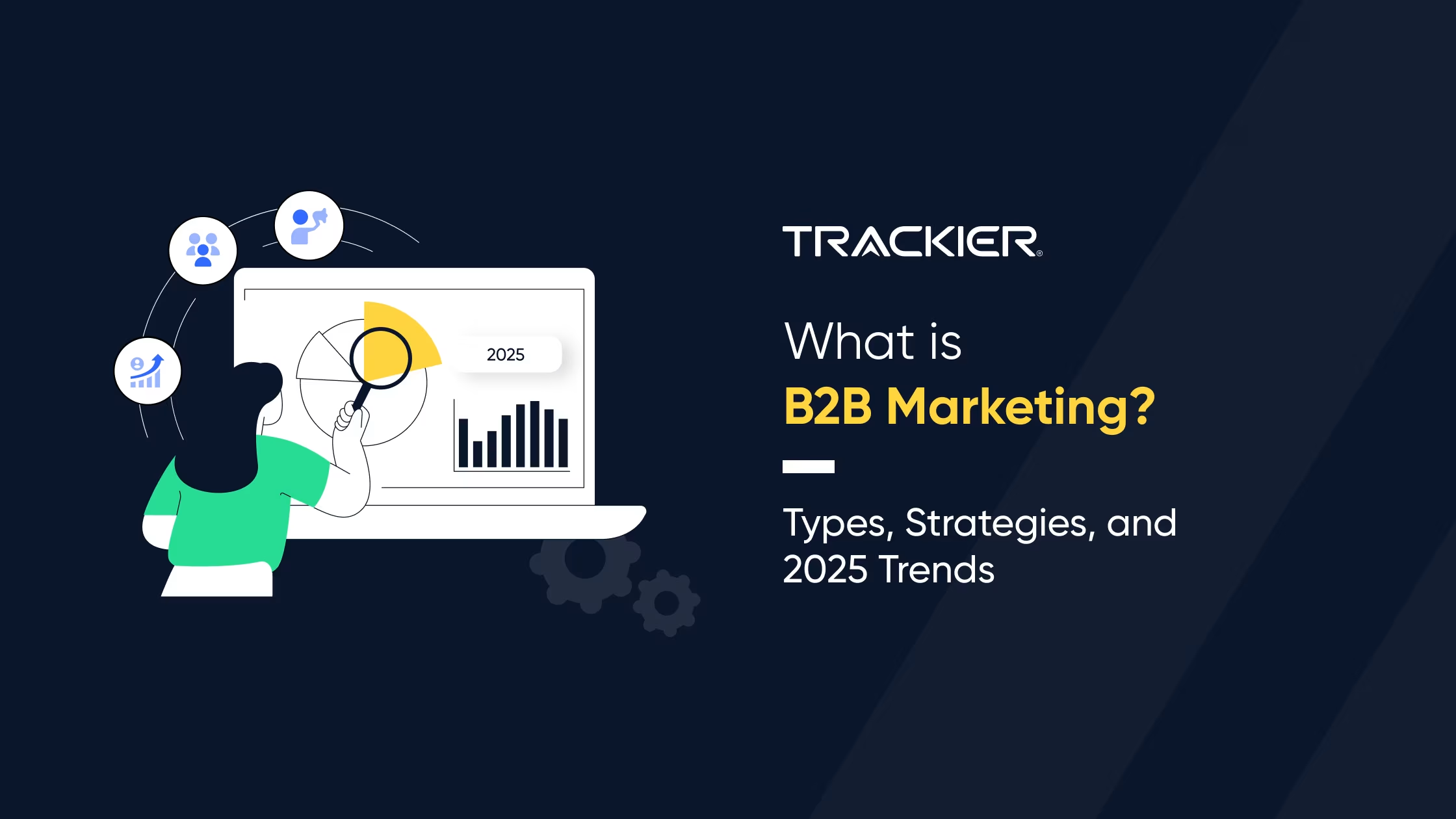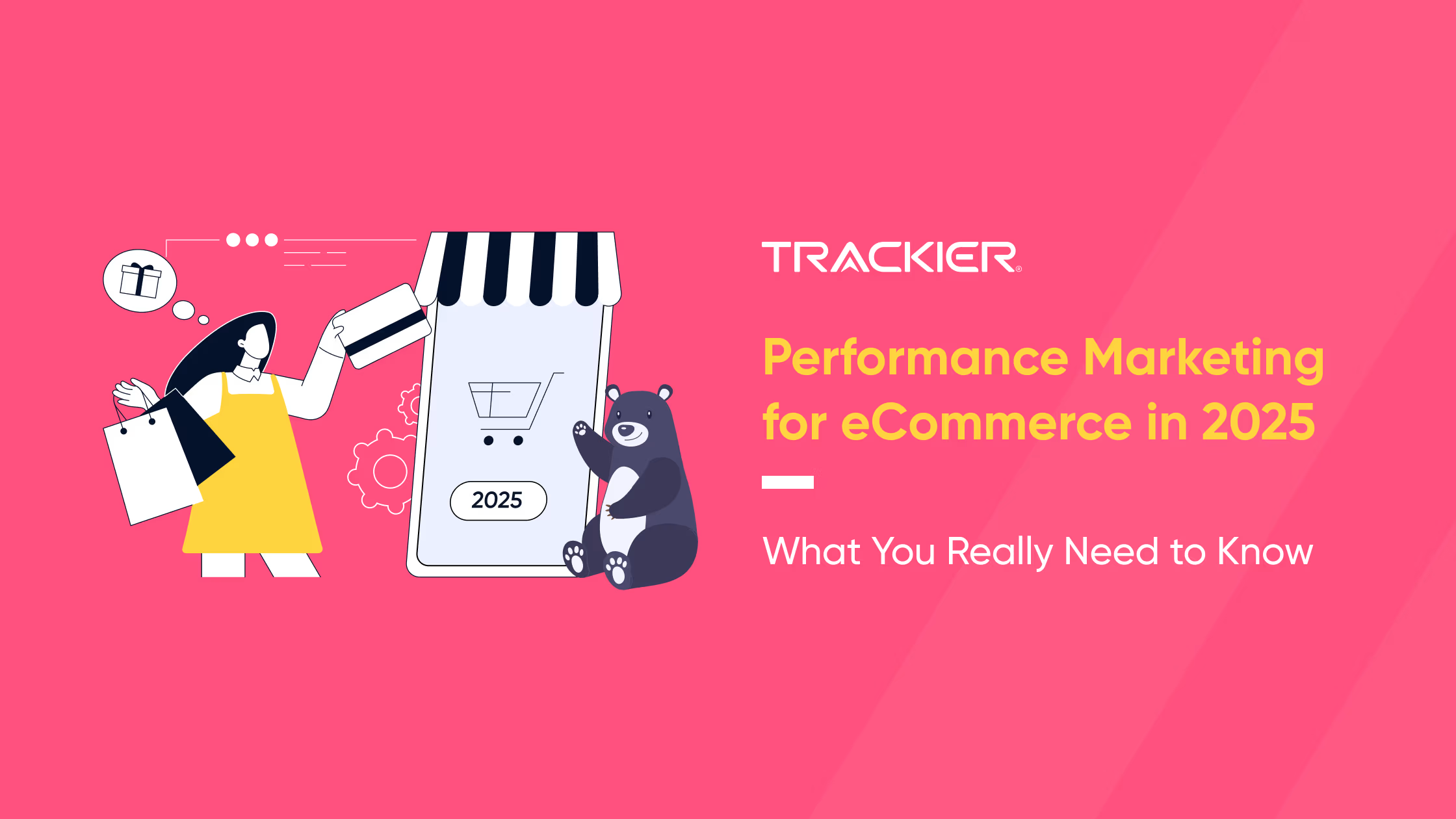The B2B marketing world is not what it used to be.
If you’re a marketer at a startup, enterprise-level brand, agency, or SaaS company, you’re constantly trying to cut through the noise and drive results.
That’s where B2B performance marketing comes in, an approach to performance marketing that focuses on curated, data-driven strategies where everything ties back to measurable results.
Whether you’re looking to generate leads, accelerate pipeline, or lower CAC, performance marketing turns marketing into a revenue driver instead of a cost center.
Let’s break down what it is, why it matters, and how you can get B2B performance marketing to work for you in 2025.
So, What Even Is B2B Performance Marketing, Really?
Alright, let’s peel back the layers. What’s the real deal with B2B performance marketing?
It’s actually pretty simple. We’re talking about a precise and data-based approach where you, the marketer, are paying for real and specific outcomes.
This is where you are measuring specific actions: clicks, sign-ups, demo requests, and (hopefully) actual sales. For B2B business, that means your campaigns are tying directly into revenue and growth.
It’s all about accountability, isn’t it? It’s a game-changer, particularly for companies that require clear ROI. And guess what? We’re not the only ones saying it.
A recent survey revealed that almost 70% of B2B marketers are set to invest more in performance-based channels in 2025. People are seeing the value.
B2B performance marketing isn’t just a fleeting trend.
Why? Well, for one, the sheer measurability is incredible.
I mean, you can track end-to-end, first click on an ad until close, everything! Which is a really clear picture of what’s working and what’s just depleting your budget.
This type of transparency makes it easy to make tweaks at lightning speed so your marketing dollars are always pulling their weight.
And pay for performance? That’s a huge risk mitigator.
Instead of just paying for eyeballs, you’re paying for actual conversions. This direct link between investment and a solid outcome? That’s what gets finance smiling, especially when every single dollar counts.
Here’s a stat to munch on: a 2025 report found that B2B companies really leaning into performance marketing strategies actually saw a 25% higher lead-to-opportunity conversion rate compared to those who weren’t. So, yeah, it’s not just a good idea, it’s a GREAT idea.
5 Secrets to Really Make Your B2B Performance Marketing Stand Out
Step 1: Know Your Target, Inside Out
Before you even think about running a campaign, you absolutely need to know exactly what you’re chasing and who you’re talking to. Fuzzy goals produce fuzzy outcomes, every time.
– Define Your Objectives: Do you want more qualified leads? Higher customer value? More demo requests? Be specific.
– Learn Your Audience: Who are your dream clients? What are they losing sleep over? Where do they spend most of their time online? This deep knowledge informs everything.
Step 2: Pick Your Battles and Your Game Plan
So you’ve determined who you’re targeting and what you want them to do. Now for the fun bit: where will you find them, and how will you get them to engage?
That’s the thing with B2B performance marketing, you have a buffet of options.
– Search Engine Marketing (SEM): For high-intent, hot leads already looking for answers.
– Social Media Advertising: Consider LinkedIn, targeting by job title or industry.
– Content Syndication: Share relevant and valuable information on third-party sites, to get qualified leads from these channels.
– Programmatic Advertising: Automated tech delivers your ads to the right people efficiently.
– Email Marketing Automation: Nurture potential clients with custom made, automated sequences leading them to conversions.
The trick here is to be tactful.
Don’t attempt to be at various places all at the same time. Choose a couple of channels where you can be really successful, measure your outcome, and then, if it is working, grow from there.
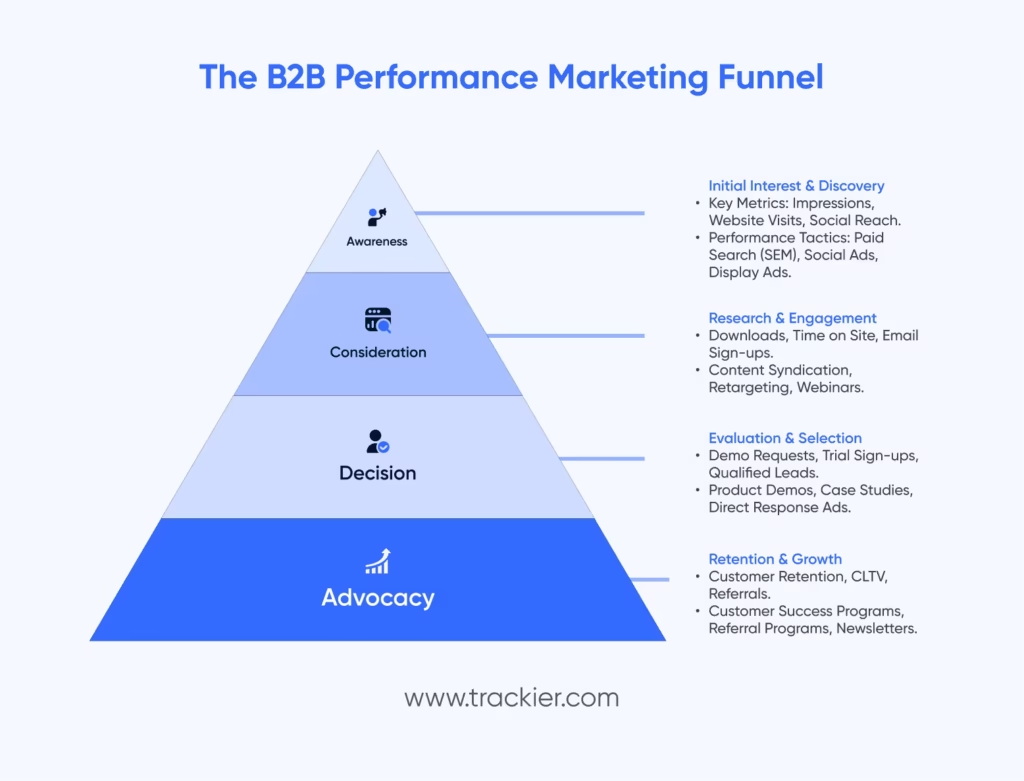
Step 3: Serve Up Content That Makes Them Say “Hmm, Tell Me More!”
Let’s be real, you can have the greatest targeted campaign of all time but if you don’t have content that excites the reader and/or offers that draw them in, it’s all going to fall flat. And here’s where your depth of understanding those buyer personas REALLY pays off.
– Educational Resources: Offer in-depth guides, whitepapers, or webinars that solve their pain points.
– Case Studies/Success Stories: Show pragmatic B2B buyers how your solution helped others.
– Interactive Tools: Calculators or assessments engage users and provide valuable data.
– Demos and Trials: For SaaS, a free trial or personalized demo often moves prospects along.
The golden rule here is that your message should always be timely, extra valuable and strategically nudges your reader to take a specific, desired action.
And speaking of valuable content, did you know that nearly half of brands today are actively using lead magnets to capture email sign-ups?
This really underscores how effective value-driven content is right now, in 2025.
Step 4: Measure, Analyze, and Keep Tweaking. Forever.
Ladies and gentlemen, I give you the GOLDEN RULE. Improving upon your content is arguably the most important area of B2B performance marketing.
Launching a campaign? That’s just the start. The real magic is achieved in that constant feedback loop of measurement, analysis, and, well, simply making things better constantly.
– Key Performance Indicators (KPIs): Monitor numbers that are directly tied to your goals, such as CPL or CAC.
– Attribution Modeling: Find out which touchpoints attribute to conversions, and credit them correctly.
– A/B Testing: Always be testing headlines, ad copy and landing page themes.
– Data Analysis: Dig deep into your data to find trends, bottlenecks, and opportunities.
– Iteration: Once you have analyzed, iterate your campaigns, alter your targeting, messaging, budgets, etc.
Look, B2B performance marketing isn’t a “set it and forget it” kind of deal. It’s an ongoing journey. You’re always learning, always adjusting, and always refining your approach based on what the real-world data is telling you.
Step 5: Embrace Technology. Seriously, Don’t Fight It.
As we motor through 2025, technology just cannot be overlooked as a way to scale your B2B performance marketing. Tech setup is everything, folks.
– Marketing Automation Platforms (MAPs): Automate tasks such as email nurturing and lead scoring, scaling personalization. In fact, 98% of B2B marketers consider marketing automation necessary for success.
– Customer Relationship Management (CRM) Systems: Essential for managing leads and customers, tracking interactions, and providing sales insights.
– Attribution and Analytics Tools: Get deep insights into campaign performance and customer behavior for data-driven decisions.
– AI and Machine Learning: Used to optimize dynamic ad targeting, predicting customer behavior and even creating personalized content. Companies using predictive AI see an average 42% reduction in their customer acquisition cost.
Bringing these technologies in doesn’t necessarily mean giving your job over to robots.
It’s about setting you, the HUMAN MARKETER, free to do the big strategic thinking and the creative stuff, while your tools take care of the more tedious, heavy lifting.
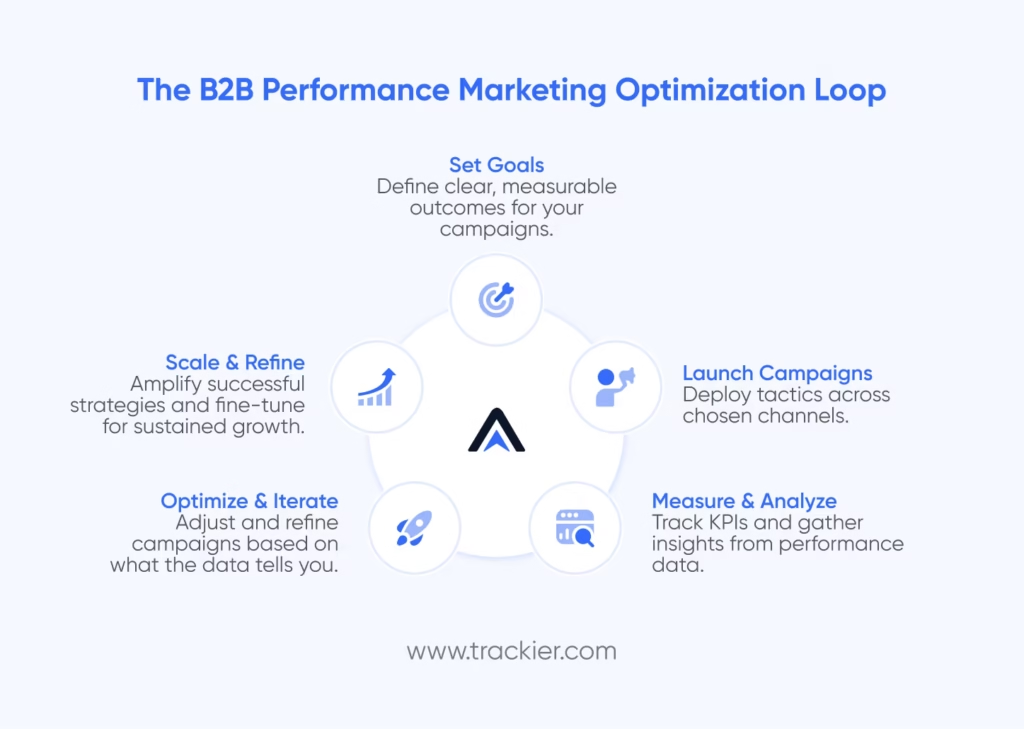
Peeking into the Future with B2B Performance Marketing
And as we sift further through 2025, the B2B performance marketing terrain is only going to continue shifting, and quickly.
To keep ahead of the pack, you have to be on the lookout for new trends and ready to adjust your approach.
The Super-Personalization Era
Generic marketing messages? Those are quickly becoming a dusty relic.
In 2025, it’s an era of hyper-personalization.
- Personalized Content: Use data and create content that speaks directly to each individual prospect.
- Deeper Connection: This approach forges stronger relationships and results in much higher conversion rates.
AI and Smart Predictions Taking Over
(AI) and (ML) are not simply trendy words, rather incredibly powerful tools that are revolutionizing B2B performance marketing once and for all.
- Optimize Everything: Utilize AI to optimize advertising spend, predict lead behavior and content automation.
- Lower Costs: Companies that apply predictive AI on average experience a 42% decrease in cost of customer acquisition.
The Non-Negotiable Need for Privacy and Trust
As everyone becomes more concerned about data privacy, building real trust with your audience is going to be more important than ever.
- Be Transparent: Demonstrate transparent data collection procedures and comply with all privacy laws.
- Earn Trust: Make privacy a priority and maintain real relationships to gain an edge.
Your Next Steps to Becoming a B2B Performance Marketing Pro
So, what is your plan going forward?
But here are a few, real steps you can take now to begin seeing those real results:
- Audit Your Current Efforts: Take a serious look at what you have been doing with your marketing campaigns. What’s truly working? What’s not hitting the mark? Where are you lacking information, or where are the gaps in your plan?
- Really Polish Those Buyer Personas: Are your buyer personas really current? Are they truly comprehensive? Take some time to dig deep and get to know your audience on a much deeper level.
- Don’t Be Afraid to Try New Channels: It’s all about testing. Experiment with new performance marketing channels. Start small, measure rigorously, and, if it’s successful, scale it further.
- Invest in the Right Tech: Think about your marketing tech stack seriously. Are there resources available that could help you automate, analyze, or personalize your efforts more effectively?
- Get Sales and Marketing Aligned: This is huge. Schedule regular meetings, share insights, and make sure there are clear communication lines between your sales and marketing teams.
Frequently Asked Questions
1. What is B2B performance marketing?
B2B performance marketing is essentially a data-driven model in which you pay for results that are specific and measurable, such as leads or conversions.
2. What are the key metrics I should track in B2B performance marketing?
Cost Per lead (CPL), Customer Acquisition Cost (CAC), Return on Ad Spend (ROAS), and your lead-to-opportunity conversion rate are some key metrics that directly impact your business goals.
3. How is B2B performance marketing different from traditional B2B marketing?
Traditional B2B marketing often pays for impressions or broad reach. Performance marketing, on the other hand, is results based. This means that you only pay when a certain action is taken.
4. What are some common challenges in B2B performance marketing that I might face?
Challenges often include longer B2B sales cycles, being able to attribute conversions properly across numerous touch points, and establishing solid alignment between both your sales and marketing teams.
5. Can B2B performance marketing really work with account-based marketing (ABM)?
B2B performance marketing and account-based marketing are a fantastic pairing.
Performance marketing tactics deliver highly targeted ads and content to specific accounts identified by ABM, allowing you to engage key decision-makers more effectively and measure that engagement precisely.
